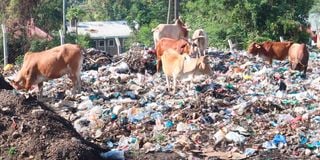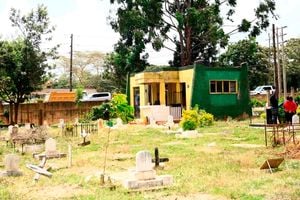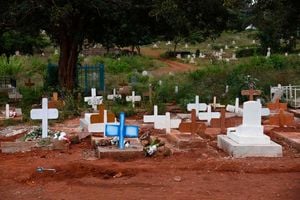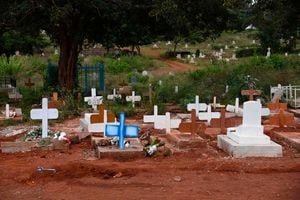
Cows feed on waste at Homa Bay town dumpsite on October 10, 2024.
The dead are supposed to rest in peace, or at least that is what people say in their tributes to the departed.
But in Homa Bay town, the local public cemetery has silently been turned into a dumpsite, hence the dead literally rest in garbage.
Graves, which are mostly dug after clearing heaps of trash, are constantly disturbed by human activities as garbage trucks arrive in intervals to dump waste every day.
Besides the vehicles, dogs, cows and scavenging birds are also frequent visitors at the site, behind Homa Bay High School, as well as scrap-metal dealers and plastic waste collectors.
Unlike the cemetery used by members of the Muslim community in the town, which is well kept with green grass, the public cemetery next to residential homes in Arunda is filled with waste and stagnant water.
For a long time, waste would pile up on top of the graves prompting a public outcry. In response the authorities demarcated certain areas of the cemetery for burials only.
But it is within the same compound hence it is still easy for waste to be blown by wind to the graves.
A worker at the site told Nation.Africa that the majority of people buried at the site are those who are unidentified. These include road accident casualties or murder victims who do not have any identification document on them.
Others are people who die in hospital wards but are unclaimed by relatives.
The hospital would, after sometime, seek court orders to dispose of the bodies at the public cemetery in a mass grave.
“I witnessed the burial of unclaimed bodies three months ago. It is rare to find a family burying their kin here,” the worker said.
Mr Erick Omondi, a 27-year-old man from Shauri Yako has been collecting scrap metal from the site for at least one year.
“I am a mason by training but when construction work is not forthcoming I try my hand at other things to survive,” Mr Omondi said.
He told the Nation.Africa he collects anything that can be recycled and sells.
"Of course I know that the site is used as a graveyard," was his answer when asked if he was aware that area was a cemetery.
The county government has been accused of flouting several environmental laws when operating the site. The National Environment Management Authority (Nema) has a set of demands that it wants the county government to abide by.
County Nema Director Josiah Nyandoro said the site should not be used for two activities at the same time.
"It should not be a dumpsite and a cemetery, in fact it is irregular to have a dumpsite and a cemetery in the same area,” Mr Nyandoro said.
Other conditions set by Nema are for the area to have a murramed road that makes it easy for vehicles to move as they dump waste.
Mr Nyandoro said waste can be dumped anywhere when the movement of vehicles becomes difficult.
“Waste can easily be dumped at the gate and not at the intended location within the site. There needs to be an improvement on this,” the environment officer said.
Another condition set by Nema for proper waste management is regular waste collection but this is not the case in Homa Bay.
Most residential areas have piles of waste in collection bins. Mr Nyandoro said garbage collection and disposal should be regular to ensure waste does not pile up.
Meanwhile, vehicles used for waste collection should have tracking documents.
“The vehicles should be sealed so that waste does not spill over as they move,” the environment officer said.
He said waste should also be sorted. This implies that glass, plastic, metal and organic matter should not be mixed when being disposed of but at the dumpsite, all sorts of waste are handled as one.
Residents around the area said the dumpsite should be moved to a new location because the foul smell from waste is affecting their health.
Ms Emily Otieno, a resident, said her family struggles to eat when the air around her home has a foul smell.
She stays about 200 meters from the dumpsite.
“It is common for my family and neighbours to have stomach upsets," Ms Otieno said.
Sometimes, workers at the site would set waste on fire to reduce their volume. But this has more consequences.
Ms Otieno, who is among residents who wish the site could be relocated to a different location said the smoke affects children who sometimes develop breathing complications.
She said it may lead to respiratory infections. “It can even lead to long term health effects like cancer,” she said.
The county government has had a proposal to move the dumpsite to a new area, preferably away from residential areas.
On August 18, 2024, an activist petitioned the county government to object to the proposed extension of cemetery use for light industrial activities.
The county government had put a public notice in one of the local dailies seeking to extend the use of land where the Homa Bay Municipality Dumpsite is situated to include light industrial use (temporary Jua Kali site), subject to approval by the devolved unit.
Mr Nyandoro said he is aware of this proposal. Mr Evance Oloo, an activist in the county opposed this idea saying it contravenes several laws.
In his petition, he said the proposed extension of land use at a designated cemetery is not only morally reprehensible but also constitutes a blatant violation of various legal provisions that protect the dignity of the deceased and the sanctity of burial sites.
“These provisions include, but are not limited to: The Constitution of Kenya (2010) - which guarantees the right to dignity and respect for the deceased. The National Museums and Heritage Act which protects sites of historical and cultural significance including cemeteries,” he wrote in the petition.
Other laws he cited in his petition include the Environmental Management and Coordination Act (EMCA), 1999- which mandates the protection of the environment, including cemetery lands, from misuse and degradation, the Penal Code (Cap 63) which criminalizes the desecration of burial sites and the unlawful disinterment of bodies and the Public Health Act (Cap 242) which requires the proper maintenance of burial grounds to prevent health risks.
Mr Oloo also cited the Local Government Act (Cap 265) (Repealed)- which, although repealed, has its functions devolved to county governments under the Constitution of Kenya 2010, including the management and protection of cemeteries.
“It is clear that the proposed extension of cemetery land for light industrial use directly contravenes these laws. Such a move not only disrespects the deceased but also undermines the rule of law and the cultural values of the community,” he wrote.
The activist issued a list of demands which he asked the county government to abide by.
It includes immediate suspension of any plans or intentions to extend the use of the cemetery for light industrial activities or any other non-cemetery purposes.
Mr Oloo also asked the devolved unit to identify and allocate an alternative piece of land for the proposed light industrial use or temporary Jua Kali site that does not encroach upon or desecrate cemetery grounds.
“Ensure strict adherence to the legal provisions protecting burial sites and take necessary actions to preserve the dignity of the deceased and the sanctity of the cemetery,” he wrote.








